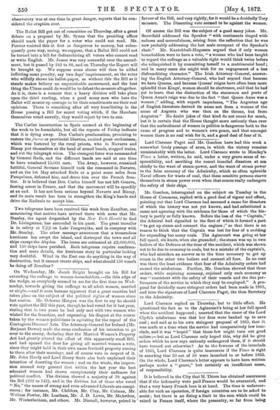Mr. Goschen, interrogated on the subject on Tuesday in the
House of Commons, replied with a good deal of vigour and effect, pointing out that Lord Clarence had assumed a cause for disasters. of which the history was not yet known, and had substituted a cause not agreeing with the evidence for those of which the his- tory is partly or fully known. Before the loss of the " Captain," the Admiral had signalled to the fleet of which it formed a part. " to get up steam and connect the engines ;" so that there is no reason to think that the Captain was lost for fear of a scolding for expending too many coals. The Agincourt was going at her full speed, six knots, when she grounded ; the steam was up in two boilers of the Defence at the time of the accident, which was shown, not to be due to economy in coals, but to a mistake of the captain's, who had mistaken an answer as to the time necessary to get up steam in the other two boilers and connect all four. In no case was there the least evidence that fear of the Admiralty orders had caused the misfortune. Further, Mr. Goschen showed that these- orders, while enjoining economy, enjoined only such economy as. was " consistent with the safety of their vessels and the due per- formance of the service in which they may be employed." A pro- posal for decidedly more stringent orders had been made in 1865, and bore the signature of Lord Clarence Paget, the then Secretary to the Admiralty.


































 Previous page
Previous page